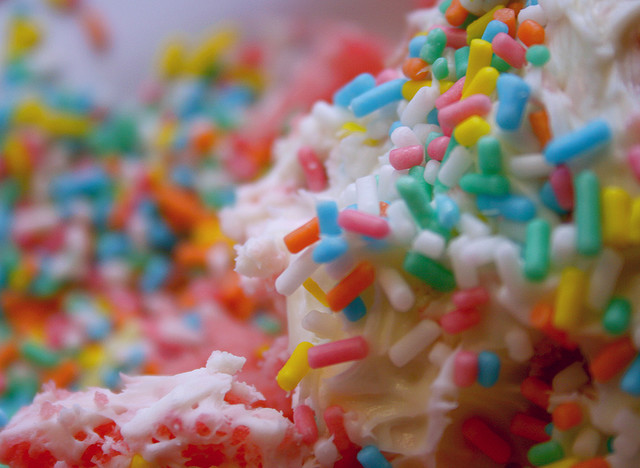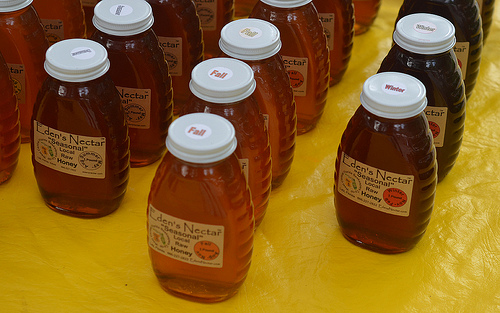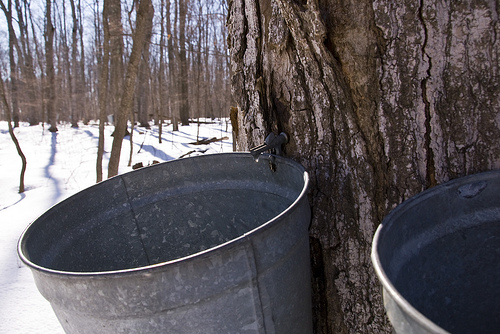I know I’m not alone on this one-I have a sweet tooth and it kicks in A LOT. There’s a reason behind this love of sweets: they make us feel good. The sweet flavors release serotonin in our brains, which creates a feeling of love and well being. It’s nice to have some validation for my love of sweets.
The number of choices out there for sweetening our food or drinks is overwhelming. Artificial sweeteners such as Aspartame, high-fructose corn syrup and Sucralose, have deservedly gotten a bad rap over the years. They are known to cause numerous side-effects ranging from headaches to cancer. Research also suggests that they can actually cause overeating among consumers.
Even natural sweeteners can come with their own baggage. Organic brown rice syrup recently made it into the lime light with findings that it contains arsenic. Agave nectar also came under fire when a report from The Weston A. Price Foundation said that it’s as bad for our bodies as high fructose corn syrup (HFCS).
With all this negative information looming about so many of the popular sweeteners the question often arises: Is there a safe sweetener choice?
Thankfully there is a way to satisfy our sweet tooth and, if eaten in moderation, our health won’t suffer.
Here are my top three natural sweeteners:
Honey
Raw, local and organic are the way to go with this natural sweetener. Not only will it sweeten your favorite cookies, it will also help sooth a cough or sore throat. Honey is often touted for having mega vitamins, minerals, and protein, but I’m not convinced the amount is significant unless you eat honey by the car load (which you shouldn’t do).
Careful when you choose your honey-recent testing by Food Safety News found that more than three-fourths of the honey sold in U.S. grocery stores isn’t exactly pure honey. The testing showed that pollen had been filtered out of the honey, thereby stripping the honey of all nutritional value and erasing any way to trace where the honey came from. Your best bet for avoiding honey that’s been filtered is to buy honey directly from bee keepers, farmers’ markets and natural food stores.
Date Sugar
Chopped, dried dates are my snack of choice when I’m looking for a sweet fix. Date sugar is made from finely chopped dried dates. It is a natural and non-processed sugar alternative filled with high fiber, vitamins, and minerals. It’s great for baking, but might not work in your hot or cold tea (it doesn’t dissolve very well).
Maple Syrup
Maple syrup is one of my favorite natural sweeteners. My kids can’t get enough of the stuff on pancakes and French toast. Maple syrup contains fewer calories and a higher concentration of minerals than honey. The syrup comes directly from the maple tree and is clear when it first comes out. After the tree is tapped the syrup is then boiled to remove the water. The end result is the deep maple syrup color and flavor that most of us are familiar with. Maple syrup is perfect for baking and sweetening your favorite drink.
When buying maple syrup it’s important to read ingredient labels carefully. Many of the syrups on the market have additional sugar and/or are not pure maple syrup. Buy organic whenever you can. Use it sparingly because organic maple syrup can be quite pricey.
Remember all sugar should be eaten in moderation-sugar is sugar and can be hazardous to our healthy in any form.
What do you use to sweeten your food and drinks?
[Photo used under Creative Commons from D. Sharon Pruitt, Robert Neff and Jim Sorbie/Flickr]
This post is part of Your Green Resource over at Green Backs Gal.



